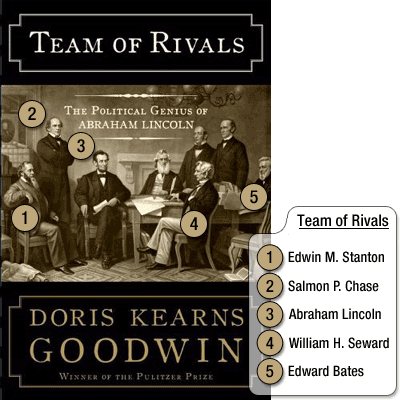







| Amazon Price | New from | Used from |
|
Hardcover, Deckle Edge
"Please retry"
|
$4.97 | $0.98 |
|
Paperback, Bargain Price
"Please retry"
|
$3.79 | $0.01 |
|
Audio CD, Abridged, Audiobook
"Please retry"
|
$15.87 | $13.00 |
|
Unknown Binding
"Please retry"
|
—
|
$8.67 | $5.27 |

Product Details
Would you like to update product info or give feedback on images?.
|
Ten years in the making, this engaging work reveals why "Lincoln's road to success was longer, more tortuous, and far less likely" than the other men, and why, when opportunity beckoned, Lincoln was "the best prepared to answer the call." This multiple biography further provides valuable background and insights into the contributions and talents of Seward, Chase, and Bates. Lincoln may have been "the indispensable ingredient of the Civil War," but these three men were invaluable to Lincoln and they played key roles in keeping the nation intact. --Shawn Carkonen
The Team of Rivals
| Team of Rivals doesn't just tell the story of Abraham Lincoln. It is a multiple biography of the entire team of personal and political competitors that he put together to lead the country through its greatest crisis. Here, Doris Kearns Goodwin profiles five of the key players in her book, four of whom contended for the 1860 Republican presidential nomination and all of whom later worked together in Lincoln's cabinet. |
 |
| 1. Edwin M. Stanton Stanton treated Lincoln with utter contempt at their initial acquaintance when the two men were involved in a celebrated law case in the summer of 1855. Unimaginable as it might seem after Stanton's demeaning behavior, Lincoln offered him "the most powerful civilian post within his gift"--the post of secretary of war--at their next encounter six years later. On his first day in office as Simon Cameron's replacement, the energetic, hardworking Stanton instituted "an entirely new regime" in the War Department. After nearly a year of disappointment with Cameron, Lincoln had found in Stanton the leader the War Department desperately needed. Lincoln's choice of Stanton revealed his singular ability to transcend personal vendetta, humiliation, or bitterness. As for Stanton, despite his initial contempt for the man he once described as a "long armed Ape," he not only accepted the offer but came to respect and love Lincoln more than any person outside of his immediate family. He was beside himself with grief for weeks after the president's death. 2. Salmon P. Chase 3. Abraham Lincoln 4. William H. Seward 5. Edward Bates |
The Essential Doris Kearns Goodwin
 Wait Till Next Year: A Memoir |  No Ordinary Time: Franklin and Eleanor Roosevelt: The Home Front in World War II |  Lyndon Johnson and the American Dream |
More New Reading on the Civil War
--This text refers to the Hardcover edition.